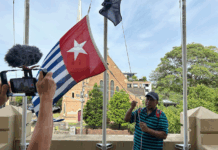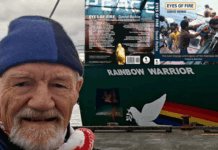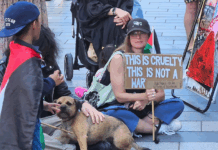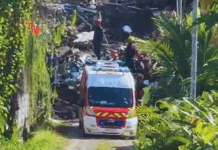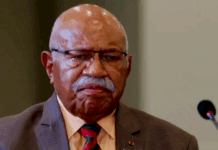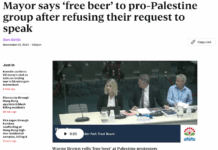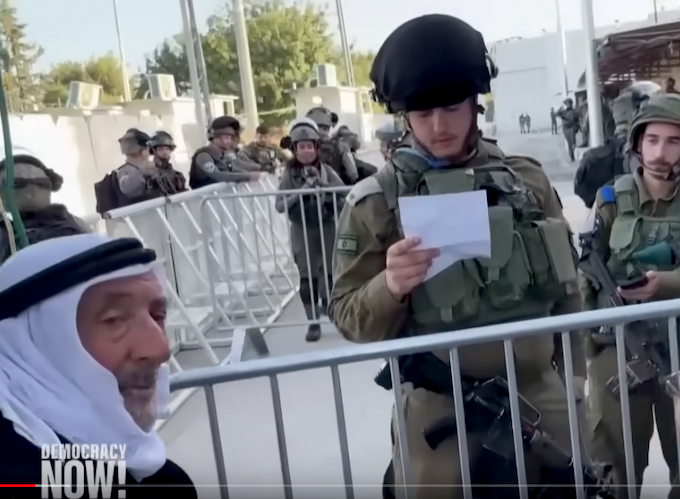
AMY GOODMAN: This is Democracy Now!, “War, Peace and the Presidency.” I’m Amy Goodman.
We end today’s show in The Hague, where the International Court of Justice ruled last Friday that Israel’s occupation of the West Bank and East Jerusalem is illegal, should come to an end — “as rapidly as possible”.
Israel’s illegal military occupation of the Palestinian Territories began in 1967, has since forcefully expanded, killing and displacing thousands of Palestinians. ICJ Presiding Judge Nawaf Salam read the nonbinding legal opinion, deeming Israel’s presence in the territories illegal.
JUDGE NAWAF SALAM: [translated] “Israel must immediately cease all new settlement activity. Israel also has an obligation to repeal all legislation and measures creating or maintaining the unlawful situation, including those which discriminate against the Palestinian people in the Occupied Palestinian Territory, as well as all measures aimed at modifying the demographic composition of any parts of the territory.
“Israel is also under an obligation to provide full reparations for the damage caused by its internationally wrongful acts to all natural or legal persons concerned.”
AMY GOODMAN: The court also said other nations are obligated not to legally recognise Israel’s decades-long occupation of the territories and, “not to render aid or assistance,” to the occupation.
The 15-judge panel said Israel had no right to sovereignty of the territories and pointed to a number of Israeli actions, such as the construction and violent expansion of illegal Israeli settlements across West Bank and East Jerusalem, the forced permanent control over Palestinian lands, and discriminatory policies against Palestinians — all violations of international law.
The Palestinian Foreign Minister, Riyad al-Maliki, praised Friday’s ruling.
RIYAD AL-MALIKI: “All states and the UN are now under obligation not to recognise the legality of Israel’s presence in the Occupied Palestinian Territory and to do nothing to assist Israel in maintaining this illegal situation.
“They are directed by the court to bring Israel’s illegal occupation to an end.“This means all states and the UN must immediately review their bilateral relations with Israel to ensure their policies do not aid in Israel’s continued aggression against the Palestinian people, whether directly or indirectly. … “[translated] All states must now fulfill their clear obligations: no aid, no collusion, no money, no weapons, no trade, nothing with Israel.”
Democracy Now! on the ICJ Palestine ruling. Video: Democracy Now!
AMY GOODMAN: In 2022, the UN General Assembly issued a resolution tasking the International Court of Justice with determining whether the Israeli occupation amounted to annexation. This all comes as the ICJ is also overseeing a [separate and] ongoing genocide case against Israel filed by South Africa and as the International Criminal Court (ICC) is seeking arrest warrants for Israeli Prime Minister Benjamin Netanyahu and Israeli Defence Minister Yoav Gallant.
Despite mounting outcry over Israel’s war on Gaza, which has killed some 39,000 Palestinians — more than 16,000 of them children — Netanyahu is set to travel to Washington, DC, to address a joint session of Congress this Wednesday.
For more, we go to Brussels, Belgium, where we’re joined by Diana Buttu, Palestinian human rights attorney and former adviser to the negotiating team of the Palestine Liberation Organisation (PLO).
Thank you so much for being with us. Diana, first respond to this court ruling. Since it is non-binding, what is the significance of it?
DIANA BUTTU: Even though it’s nonbinding, Amy, it doesn’t mean that it doesn’t have any weight. It simply means that Israel is going to ignore it. But what it does, is it sets out the legal precedent for other countries, and those other countries [that] do have to respect the opinion of the highest court, the highest international court.
And so, what we see with this decision is that it’s a very important and a very necessary one, because we see the court makes it clear not only that Israel’s occupation is illegal, but it also says that all countries around the world have an obligation to make sure that Israel doesn’t get away with it, that they have an obligation to make sure that this occupation comes to an end.
This is very important, because over the years, and in particular over the past 30 years, we’ve seen a shift in international diplomacy to try to push Palestinians to somehow give up their rights. And here we have the highest international court saying that that isn’t the case and that, in fact, it’s up to Israel to end its military occupation, and it’s up to the international community to make sure that Israel does that.
AMY GOODMAN: And exactly what is the extended decision when it comes to how other countries should deal with Israel at this point?
DIANA BUTTU: Well, there are some very interesting elements to this case. The first is that the court comes out very clearly and not just says that the occupation is illegal, but they also say that the settlements have to go and the settlers have to go.
They also say that Palestinians have a right to return. Now, we’re talking about over 300,000 Palestinians who were expelled in 1967, and now there are probably about 200,000 Palestinians who have never been able to return back — we’re just talking about the West Bank and Gaza Strip — because of Israel’s discriminatory measures.
The other thing that the court says is that it’s not just the West Bank and East Jerusalem that are occupied, but also Gaza, as well. And this is a very important ruling, because for so many years Israel has tried to blur the lines and make it seem as though they’re not in occupation of Gaza, which they are.
And so, what this requires is that the international community not only not recognise the occupation, but that they take into account measures or they take measures to make sure that Israel stops its occupation.
That means everything from arms embargo to sanctions on Israel — anything that is necessary that can be done to make sure that Israel’s occupation finally comes to an end. And this is where we now see that instead of the world telling Palestinians that they just have to negotiate a resolution with their occupier, with their abuser, that the ball is now in their court.
It’s up to the international community now to put sanctions on Israel to end this military occupation.
AMY GOODMAN: I wanted to ask you about what’s happening right now in Gaza. You’ve got the deaths at — it’s expected to be well over 39,000. But you also have this new report by Oxfam that finds Israel has used water as a weapon of war, with Gaza’s water supplies plummeting 94 percent since October 7 and the nonstop Israeli bombardment.
Even before, their access was extremely limited. And then you have this catastrophic situation where you have, because of the destruction of Gaza’s water treatment plants, forcing people to resort to sewage-contaminated water containing pathogens that lead to diarrhoea, especially deadly for kids, diseases like cholera, dysentery, hepatitis A and typhoid.
Meanwhile, the Israeli army has started to vaccinate the Israeli soldiers after Palestinian health authorities said a high concentration of the poliovirus has been found in sewage samples from Gaza. It’s taking place, the vaccination programme of soldiers, across Israel in the coming weeks. The significance of this, Diana?
DIANA BUTTU: This is precisely what we’ve been talking about, which is that Israel is carrying out genocide, they know that they’re carrying out genocide, and we don’t see that anybody is stopping Israel in carrying out this genocide.
So, here now we have yet another International Court of Justice ruling. This one — the previous ones are actually binding, saying that Israel has to take all measures to stop this genocide. And yet we just simply don’t see that the world has put into place measures to sanction Israel, to isolate Israel, to punish Israel.
Instead, it gets to do whatever it wants.
But there is something very important, as well, which is that Israel somehow believes that it’s going to be immune, that somehow this polio or all of these diseases aren’t going to boomerang back into Israeli society. They will.
And the issue here now is whether we are going to see some very robust action on the part of the international community, now that we have a number of decisions from the ICJ saying to Israel that it’s got to stop and that this genocide must come to end. Israel must pay a price for continuing this genocide.
🚨Before @netanyahu lands in DC, we demand @TheJusticeDept investigate him for genocide, war crimes & torture in Gaza. Nearly 40k killed, including more than 14k children, 90k injured, 2 million displaced, & an entire population subject to starvation. This cannot go unanswered. pic.twitter.com/2id5cpOa58
— The CCR (@theCCR) July 19, 2024
AMY GOODMAN: Diana Buttu, I wanted to end by asking you about Benjamin Netanyahu coming here to the US. The Center for Constitutional Rights tweeted, “Before @netanyahu lands in DC, we demand @TheJusticeDept investigate him for genocide, war crimes & torture in Gaza. Nearly 40k killed, including more than 14k children, 90k injured, 2 million displaced, & an entire population subject to starvation. This cannot go unanswered.”
If you can talk about the significance of Netanyahu addressing a joint session of Congress?
Also, it’s expected that the person who President Joe Biden has said he is supporting, as he steps aside, to run for president, Vice-President Kamala Harris, is expected to be meeting with Netanyahu. And what you would like to see happen here?
DIANA BUTTU: You know, it’s repugnant to me to be hearing that a war criminal, a person who has flattened Gaza, who said that he was going to flatten Gaza, who has issued orders to kill more than 40,000, upwards of 190,000 Palestinians — we still don’t know the numbers — who has made life in Gaza unlivable, who’s using Palestinians as human pinballs, telling them to move from one area to the next, who’s presiding over a genocide, and unabashedly so — it’s going to be shocking to see the number of applause and rounds of applause and the standing ovations that this man is going to be receiving.
It very much signals exactly where the United States is, which is complicit in this genocide.
And Palestinians know this. If anything, he should have not had received an invitation. He should simply be getting a warrant for his arrest, not be receiving applause and accolades in Congress.
AMY GOODMAN: Diana Buttu, I want to thank you so much for being with us, Palestinian human rights attorney, joining us from Brussels, Belgium.
Democracy Now! is licensed under a Creative Commons Attribution-Noncommercial-No Derivative Works 3.0 United States Licence. Republished under this licence.



